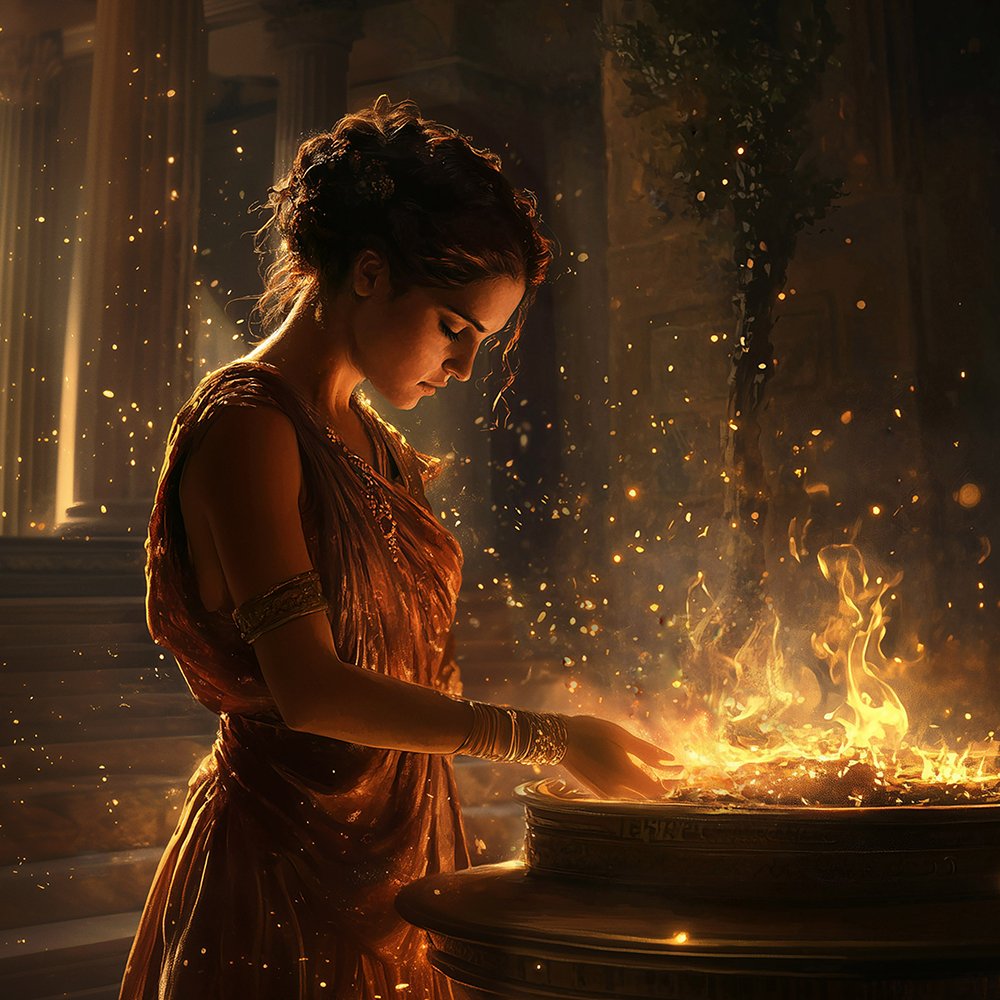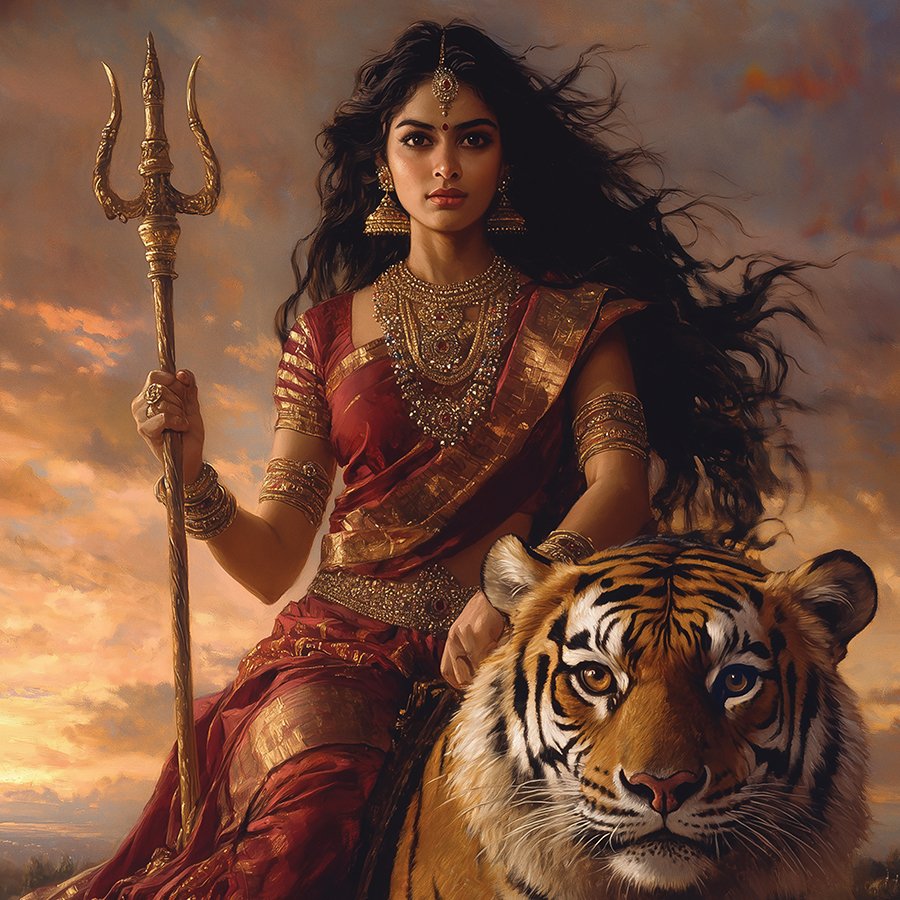Hestia/Vesta
Hestia, the gentle guardian of the hearth, embodies the sacred flame that warms both home and spirit. Her quiet strength reminds us of the power in stillness and the importance of tending to our inner sanctuaries with devotion and care.
Isis
As the Mid-Atlantic bids farewell to summer’s heat and humidity, a cooler breeze signals the approach of autumn—a season rich with change and renewal. It brings to mind the cycles of life and death, growth and decay, echoing the story of Isis, the Egyptian goddess of motherhood, magic, and transformation. Her story is one of unwavering devotion and transformative power, guiding us to embrace our own cycles of loss and renewal with grace and resilience.
Durga
Durga, the fierce and powerful goddess of Hindu mythology, embodies the ultimate power of the divine feminine, riding into battle on a lion or tiger with unmatched grace and strength. Her story, rooted in the cosmic struggle between good and evil, serves as a timeless reminder of the indomitable force of righteousness and the inner strength that lies within us all. As a protector and spiritual mother, Durga's energy resonates far beyond myth, inspiring those who seek courage, transformation, and empowerment. Her legacy is a living narrative that continues to guide and uplift, reminding us that with unwavering faith, good will always triumph over evil.
Aphrodite
Aphrodite, the iconic goddess of love, beauty, and desire, transcends mythology to embody the essence of passion and devotion. Born from the sea foam in a dramatic tale of divine retribution, Aphrodite’s influence extends far beyond her origins, weaving through the fabric of ancient and modern cultures alike. From her passionate affairs with gods and mortals to her role as a muse for artists and lovers, Aphrodite’s legacy reminds us of the enduring power of love and beauty. Her myths and presence continue to inspire, offering timeless insights into the complexities of desire and the transformative nature of love.
Hemera
Hemera, the lesser-known Greek goddess of day, symbolizes the transition from darkness to light, heralding the dawn and awakening life each morning. As the daughter of Nyx and Erebus, Hemera plays a crucial role in Greek cosmogony, embodying light, hope, and renewal. Though her myths are few, her significance lies in what she represents—prosperity, vitality, and the enduring power of light over darkness. Hemera’s timeless presence continues to inspire, reminding us of the boundless potential each new day holds and the delicate balance between life and death.
Feng Po Po
As we embrace the airy energies of Gemini season, the Chinese goddess Feng Po Po, revered as Madame Wind, offers a powerful connection to the element of Air. This wise and elder goddess, often depicted riding a tiger and controlling the winds with her fan or flask, embodies the deep respect for age and wisdom found in Chinese culture. Her myths highlight the dual nature of the elements—both nurturing and destructive—while emphasizing the importance of environmental stewardship and balance. Feng Po Po’s legacy continues to inspire, reminding us of the enduring power of wisdom and our connection to the natural world.
Cybele, the Great Mother
Cybele, known as the Great Mother or Magna Mater, is a powerful symbol of fertility and the untamed forces of nature in ancient mythology. Originally revered in Phrygia, her worship spread across the Greco-Roman world, where she was celebrated for her connection to the earth’s cycles. Her myths, especially the tragic tale of Attis, underscore themes of rebirth and renewal. Cybele’s enduring legacy reflects humanity’s deep reverence for the nurturing and transformative powers of the natural world.
Athena
Athena, the revered goddess of wisdom, intelligence, and war, holds a significant place in ancient mythology. Known for her strategic mind and unwavering commitment to justice, she was often depicted in her warrior's armor, accompanied by an owl, symbolizing wisdom. Athena's unique birth story, emerging fully grown from Zeus's head, highlights her profound connection to intellect and rational thought. Her influence extended beyond warfare, as she was also a patron of the arts and crafts, embodying the ideals of wisdom, creativity, and civilization.
Hathor
Hathor, a highly revered deity in ancient Egypt, embodied love, beauty, music, fertility, and pleasure, appealing to both women and men. Worshiped primarily in Dendera, her influence spanned from protection to afterlife care. As the wife of Horus and daughter of Ra, she symbolized maternal nurturing and divine queenship. Hathor’s legacy, including her connection to cosmetics and festivals, remains a significant part of Egyptian spiritual heritage.
Yemoja
Yemoja, also known as Yemanjá or Yemayá, is the major water deity in the Yoruba religion, revered as the mother of all Orishas and humanity. Her name, meaning "Mother Whose Children are the Fish," signifies her as the source of all waters and life. Yemoja embodies nurturing motherhood, fertility, and protection, yet also wields the Sea's power in fury when provoked. Her worship, spread across the Americas, highlights her role as a nurturing, protective figure and a symbol of the divine feminine's mysteries and wisdom.
Hina
Hina, a revered goddess in Polynesian mythology, embodies femininity, creativity, and the natural world. Associated with the moon, sea, and life cycles, she symbolizes fertility and the divine feminine energy of nature. Hina's myths, particularly her descent into the underworld, reflect resilience and spiritual enlightenment. As a patroness of the arts, she inspires creativity, with her presence felt in nature and celebrated through various rituals and festivals across Polynesia.
Vesna
As spring emerges across the northern hemisphere, the Slavic goddess Vesna symbolizes the season's renewal and vitality. Rooted in ancient beliefs, Vesna, often depicted as a youthful maiden adorned with flowers, embodies the cyclical battle between life and death, constantly struggling against Morana, the personification of winter. Celebrations like Maslenitsa and Kupala Night honor Vesna, blending pagan and Christian traditions to mark the arrival of spring with joyous rituals. Vesna's legacy continues to resonate, connecting people with their cultural heritage and the rhythms of nature, reminding us of the enduring promise of renewal and the interconnectedness of all life.
Longmu, Mother of Dragons
Longmu, the original Mother of Dragons, is a revered figure in Chinese mythology. Born as Wen Shi in 290 BC, she nurtured five snakes from a stone egg, which later transformed into powerful dragons. These dragons protected her village, earning her the titles of "Mother of Dragons" and "Divine Human." Her story, celebrated for its themes of maternal love and devotion, continues to inspire reverence today, symbolizing the enduring virtues of strength, protection, and nurturing motherhood. Temples and festivals honor her legacy, reflecting her significance in both ancient and modern Chinese culture.
Skadi
Embark on a mythical journey through the Norse Pantheon with Skadi, the goddess whose essence embodies the harsh beauty of winter and the untamed wilderness of Nordic landscapes. Known for seeking justice for her father Thjazi’s death at the hands of Loki, Skadi’s quest for retribution brings her to Asgard, where she faces a peculiar challenge to select a husband by the sight of their feet, ultimately choosing the sea god Njord. Residing in Thrymheim, a celestial realm of snow-covered peaks, Skadi commands the icy winds and is revered by hunters and those seeking warmth and prosperity in winter’s harshness. Beyond her role as a winter deity, Skadi symbolizes justice, wisdom, and resilience, offering strength and inspiration to those facing adversity.
Selu
Selu, the revered goddess of corn in Native American mythology, is a central figure in the beliefs of several southeastern tribes, including the Cherokee and Creek. Created by the Great Spirit to provide sustenance, Selu is celebrated for her power to ensure a bountiful harvest and her nurturing nature. According to Cherokee mythology, Selu, the first woman and corn goddess, was killed by her sons who feared her magical abilities, but she instructed them to bury her body, transforming her essence into corn seeds to feed future generations. Today, Selu remains a symbol of wisdom, prosperity, and the cyclical nature of life, continuing to inspire spiritual practices and reverence in indigenous communities.
Amaterasu
Amaterasu, the Japanese sun goddess, shines as a central figure in Japanese mythology and Shinto religion. Her name, translating to "shining in heaven," reflects her role as the supreme deity and ruler of Takamagahara, the heavenly realm. Born from the left eye of the primordial deity Izanagi, Amaterasu embodies the sun's brilliance, symbolizing life, growth, and fertility. Revered as the guardian of rice cultivation and purity, her shrine at Ise Grand Shrine stands as one of Japan's most sacred sites. Amaterasu’s legends, including her retreat into a cave due to her brother Susanoo’s misdeeds and her subsequent return to bring light back to the world, underscore her vital role in maintaining harmony and prosperity.

















